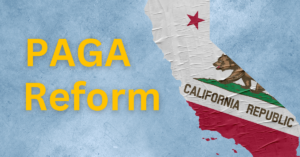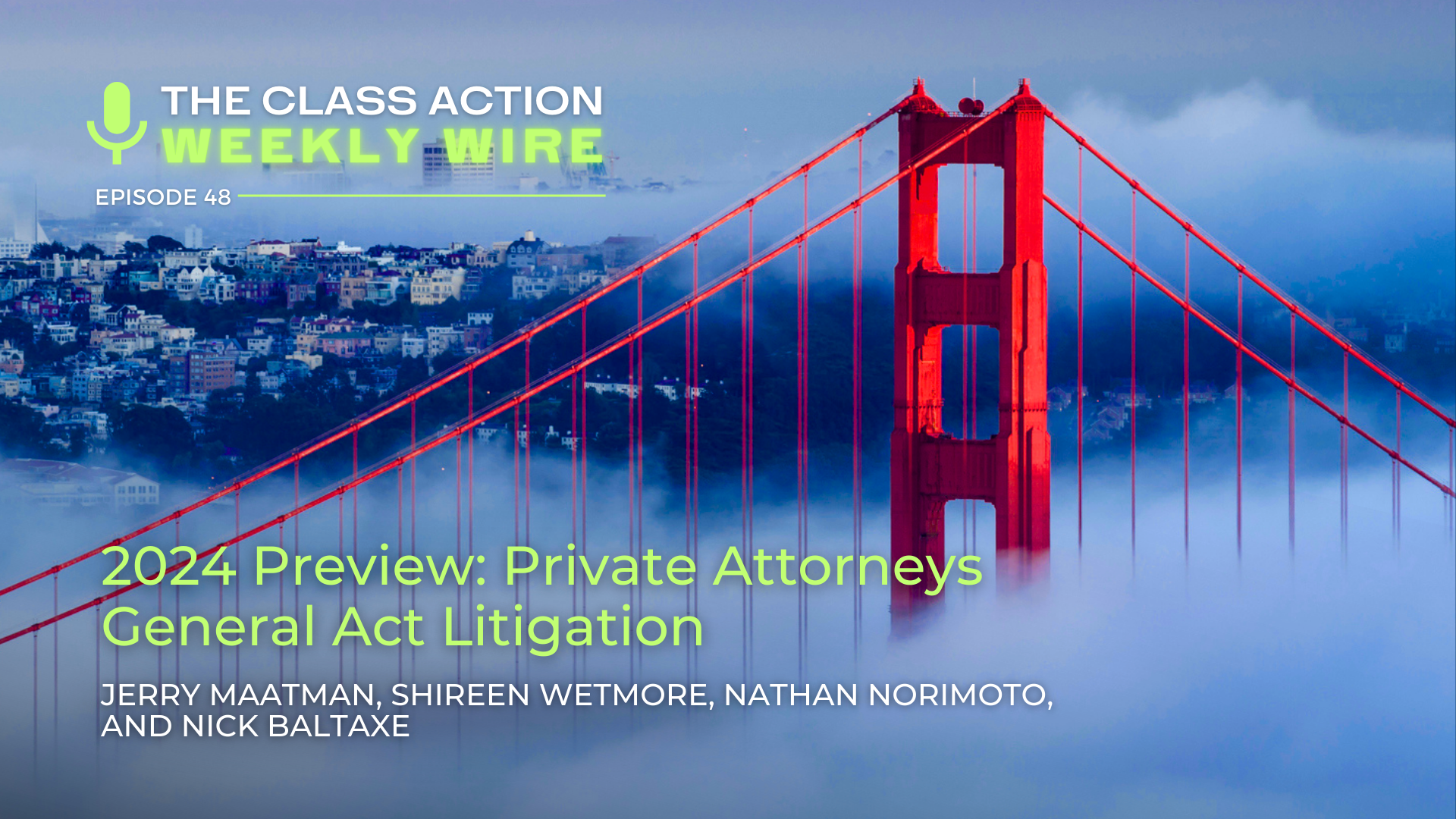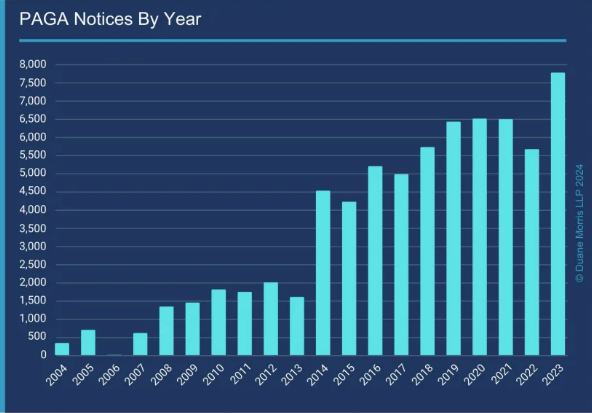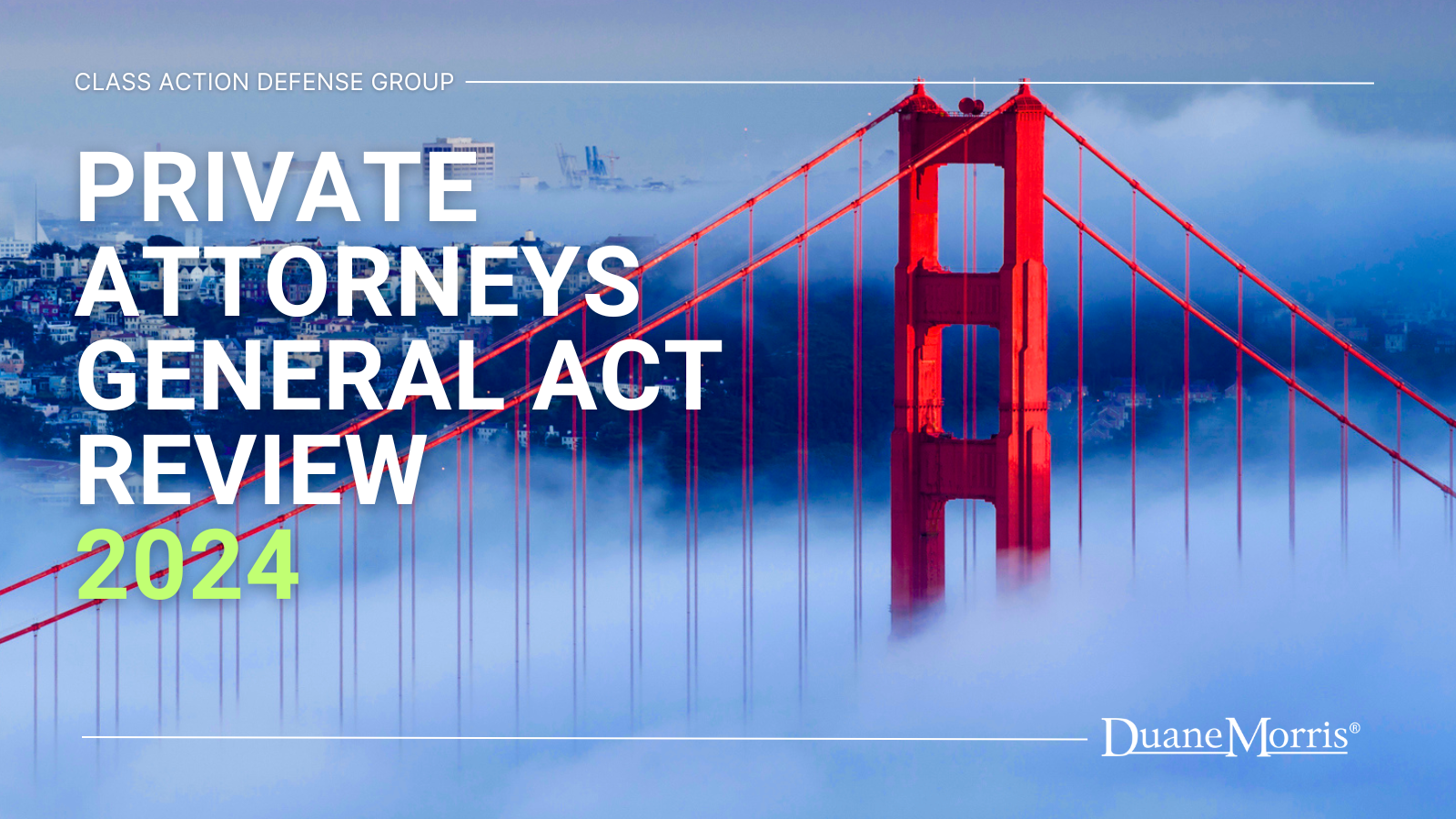 By Jennifer Riley and Gerald L. Maatman, Jr.
By Jennifer Riley and Gerald L. Maatman, Jr.
Duane Morris Takeaways: PAGA reform is here. On June 27, 2024, the California Legislature signed off on two bills (AB 2298 and SB 92) resulting in significant reforms to California’s Private Attorneys General Act (“PAGA”). Governor Newsom previously announced the deal between business and labor groups, which also means the referendum to repeal PAGA will not appear on the November ballot. Once signed into law by the Governor, the new reforms will bring sweeping changes to the PAGA. These changes aim to curtail many of the criticisms that have been levied at the PAGA from both groups. The changes apply to PAGA actions in which the PAGA notice was filed on or after June 19, 2024 and it is anticipated that the changes will also have an immediate impact on litigation strategy in pending PAGA actions filed before that date as well.
California Legislature Approves PAGA Reform Bills
After Governor Newsom announced on June 18, 2024, that labor and business interests had inked a deal significantly altering the PAGA, the California Legislature quickly moved to approve two bills (AB 2288 and Senate Bill 92). Proponents of the initiative to repeal PAGA had agreed to withdraw the referendum if the bills were passed within the deadline to withdraw the referendum. The bills were approved just in the nick of time — on June 27, 2024, which was both the deadline to withdraw the the PAGA referendum and the date the two bills were passed. These changes include reforms to the penalty structure, new defenses for employers, standing requirements limiting the scope of PAGA actions, and a new “cure” process for both small and large employers, among other changes that will significantly impact litigation strategy for PAGA claims (and likely spawn new legal questions as the law is tested in the field and the courts.) The reforms do not alter the requirement that a claimant first file a notice with the Labor & Workforce Development Agency (“LWDA”) also known as an LWDA or PAGA notice. These reforms affect all PAGA notices filed on or after June 19, 2024, with some exceptions, described in further detail below.
Penalty Structure Reforms
One of the primary complaints from business interests, in particular small business interests, was that the PAGA’s penalty structure frequently resulted in potential penalties in the millions upon millions of dollars based on the barest of allegations, often of highly technical violations of the Labor Code. Employers complained that these violations did not implicate any actual harm to employees and that there could be compounded penalties for so-called “derivative” claims. The compounding of penalties meant plaintiffs would try to stack multiple penalties based on the same alleged act or omission by an employer. The new PAGA addresses several of these complaints, eliminating some penalties altogether, limiting the availability of penalties for certain derivative claims, and clarifying how penalties are calculated.
- Clarity on Initial vs. Subsequent Violations: Previously, PAGA penalties were set at $100 for “initial” violations of the Labor Code and $200 for any “subsequent” violations, unless otherwise prescribed by statute. The reforms removed the distinction between “initial” and “subsequent” violations — now the civil penalty for an alleged violation is $100 for each aggrieved employee per pay period. However, a court may reduce a penalty award in order to avoid an award that is unjust, arbitrary and oppressive, or confiscatory. See Lab. Code § 2699(e)(2). Repeat offenders may be subject to higher penalties.
- Reduced Penalties for Isolated Events: If the violation resulted from an isolated, non-recurring event (e., the violation had not extended beyond the lesser of 30 days or four consecutive pay periods), the penalties are further limited to $50 per aggrieved employee per pay period. See Cal. Lab. Code § 2699(f)(2)(A)(ii).
- Reduced Penalties for Wage Statement Violations: If the violation is a violation of Labor Code section 226 for non-complaint wage statements, additional limitations apply. For violations of § 226(a) (other than (a)(8) regarding the legal name or address of the employer), the penalty is $25 for each aggrieved employee per pay period if the employee could promptly and easily determine accurate information from the wage statement or if the employee would not be confused or misled about the correct identity of their employer. If the violation involves § 226(a)(8), the penalty is $25 if the employee would not be confused or misled about the correct identity of their employer or, if their employer is a farm labor contractor, the legal entity that secured the services of that employer. These limitations do not apply if the employer failed to provide a wage statement to the employee. See Lab. Code § 2699(f)(2)(A)(i).
- Special Rules for Increased Penalties: In lieu of the “subsequent violation” penalty, a $200 penalty per aggrieved employee per pay period can now only be levied in certain circumstances. Specifically, this amount may only be awarded where an agency or court has determined that the employer’s policy or practice led to that same violation of the Labor Code in the previous five years or if a court determines that the employers’ conduct was malicious, fraudulent, or oppressive. See Lab. Code § 2699(f)(2)(B).
- No Additional Recovery For Derivative Penalties Under Labor Code Sections 201, 202, or 203: An employee can no longer recover additional penalties for violations of Labor Code section 201, 202, or 203, which address when an employee must be paid upon resignation or termination, when seeking recovery for underlying wage violations. The same applies to Labor Code sections 204 and 226, unless the violation meets heightened scienter requirements as outlined below. See Lab. Code § 2699(i).
- Limited Recovery Under Labor Code Sections 204 and 226: An employee can recover additional penalties for Labor Code section 204, which addresses when an employee must be paid during their employment, if that violation is willful or intentional. Additionally, an employee can recover additional penalties for violation of Labor Code section 226, which mandates that certain information be included on wage statements, if that violation is knowing, intentional, or involves a complete failure to provide a wage statement. See Lab. Code § 2699(i).
- Pay Period Defined: PAGA originally imposed monetary penalties on a per pay period basis. This unfairly penalized employers that paid employees on a weekly basis, as opposed to a biweekly basis. The reforms address this disparity, by clarifying that the recoverable penalties will be reduced by 50% where an employer’s regular pay period is weekly rather than biweekly.
- Employee’s Share Of Recovery Increased: The percentage of penalties awarded to the aggrieved employees has been increased from 25% to 35%.
The “Cure” For Employers’ Ills
The reforms also introduce a new and more complicated “cure” process for avoiding or reducing penalties. Employers may take steps before a complaint is filed, or during litigation, to limit potential penalties.
- Pre-LWDA Notice Penalty Cap: If, before receiving an LWDA notice or a request for records from the employee, an employer takes “all reasonable steps” to cure the violations alleged in the LWDA letter, awardable penalties are now capped at no more than 15% of the total available penalties. See Lab. Code § 2699(g).
- Post-LWDA Notice Penalty Cap: The penalty cap is increased to 30% if the “reasonable steps” are taken within 60 days of receiving the LWDA Notice. See Lab. Code § 2699(h).
An employer takes “all reasonable steps” if it conducts periodic payroll audits and takes action in response to those audits, disseminates lawful policies, trains supervisors on applicable Labor Code and wage order compliance, and takes appropriate corrective action with regard to its supervisors. Whether or not an employer’s conduct was reasonable will be evaluated by the totality of the circumstances. See Cal. Lab. Code § 2699(g)(2).
Eliminating Penalties Altogether
In addition to these caps, there is now a path towards the complete elimination of PAGA penalties if an employer cures an alleged labor code violation. Specifically, if an employer takes the “reasonable steps” defined by statute and actually cures an employee’s unpaid wages, the employee can no longer recover PAGA penalties for the Labor Code violation. The “cure” is effective when the employee is “made whole,” or provided an amount sufficient to recover any unpaid wages due to the alleged violations going back three years from the date of the notice. However, this amount must also include seven percent interest, liquidated damages that are required by statute, and a reasonable attorneys’ fees award as determined by the court or agency. Practically speaking, this “cure” option will likely still require costly outlays to ensure all fees are covered and potentially litigation over the reasonableness of the claimed attorneys’ fees. We anticipate that, in response to these complicated requirements, employee’s may start to include in the LWDA notice a calculation of the proposed “cure” amount, much like an initial settlement demand.
New Standing Requirement
Prior to the passage of these bills, judicial interpretations of the statute held that an employee who experienced a single Labor Code violation could bring a claim for violations of any provision of the Labor Code on behalf of aggrieved employees, even for violations the employee bringing the claim never experienced. Now, an employee must have suffered every violation he or she attempts to bring on behalf of other aggrieved employees. This inclusion effectively negates the California Court of Appeal’s ruling in Huff v. Securitas Security USA Services, Inc., 23 Cal.App.5th 745 (2018), which held that an employee could seek PAGA penalties for any and all Labor Code violations, even if the employee had not experienced those violations. The new standing requirement will narrow the scope of PAGA actions to only those allegedly suffered by the PAGA plaintiff—and by extension add some guard rails to discovery as well as the size of the representative group at issue.
Manageability Is Back!
The bills also codified a long-litigated potential defense known as “manageability.” Specifically, in January of this year, the California Supreme Court struck down the limited defense that employers had been using to try to reign in PAGA matters, holding that trial courts did not have the inherent authority to strike a claim as unmanageable. See Estrada v. Royal Carpet Mills, Inc., 15 Cal.5th 582 (2024). Now, courts are empowered by statute to limit evidence presented at trial or the scope of the claims to ensure that the case is manageable and may be effectively tried. It will remain to be seen whether requests for trial plans enter the employer’s toolbox in these representative matters as they have in California class actions.
Injunctive Relief
Another criticism of the PAGA was the inability of a PAGA plaintiff to seek injunctive relief, effectively making PAGA a bounty-hunter statute with no real teeth to effectuate change. Under the new reforms, an employee can now seek injunctive relief related to alleged Labor Code violations. Employers should be prepared for new PAGA claims to include requests that the Court require the employer to modify their practices to ensure compliance with Labor Code provisions. This is reminiscent of the injunctive relief available to plaintiffs under California’s Unfair Competition Law. Labor had identified this provision as a key priority for PAGA reform and comments from representatives from the business community reflect the common interest in working towards full compliance with the Labor Code for all employers and employees.
New Early Evaluation Procedures For Large And Small Businesses
The reforms introduce new procedures both with the LWDA and the courts to allow for effective litigation, and potential early resolution, of these claims.
For PAGA notices (and their associated claims) filed on or after June 19, 2024, employers who employed at least 100 employees during the PAGA period can now request an “early evaluation conference” and a request to stay the proceedings before or simultaneous with the employer’s responsive pleading. This request must include a statement from the employer identifying which allegations it disputes and which allegations it will cure. The court will then set an early evaluation conference. To the extent the employer stated they would cure any of the alleged violations, the court may also ask the employer to submit to the neutral and plaintiff, on a confidential basis, the employer’s plan to cure the deficiencies. If other violations remain in dispute, the neutral may stay the consideration of the cure plan or agreement until after the litigation of the disputed issues.
If the neutral approves the cure plan, the employer must submit evidence within ten days showing that the cure occurred. If the neutral, employer, and employee all agree the violations have been cured, they will submit a joint statement to the court setting forth the terms of their agreement. If the neutral or employee does not agree that the violation was cured, the employer may file a motion to request the court to approve the cure. The employer can submit evidence with this motion showing that the alleged violations were corrected. Any PAGA penalties calculated with these cures must take into account other limitations and caps on penalties that would be applicable due to the prompt cure.
Smaller employers have a separate early evaluation process. Before October 1, 2024, employers with fewer than 100 employees during the PAGA period cannot take advantage of this early conference. However, starting October 1, 2024, employers with under 100 employees can submit a confidential proposal to the LWDA within 33 days of their receipt of notice that lays out their exact plan for the cure. The LWDA can make a determination on the sufficiency of the cure at the outset or set a conference to determine the sufficiency of the cure.
If the cure is facially sufficient or if the LWDA believes a conference is needed to discern the sufficiency of the cure, the LWDA will set a conference. This is an accelerated timeline, as the LWDA must rule on the plan within 14 days of its submission and the conference must occur within 30 days of that date. At this conference, the LWDA will discern if the cures are sufficient, whether or not any additional information is needed, and set a deadline to complete the cure.
When the employer completes the cure, it must provide to the LWDA and the plaintiff a sworn notification to the employee and agency that the cure is completed, accompanied by a payroll audit and check register if the violation involves a payment obligation. The LWDA must confirm whether the cure was completed within twenty days of receiving the cure documents. If the LWDA preliminarily believes the violation has been cured, the LWDA must provide notice to the plaintiff that the cure is complete. If a plaintiff disagrees with the decision, the plaintiff may request a hearing on that determination. If the LWDA confirms the violation was cured, the employee cannot continue with a civil action. The employee can also appeal this determination to the superior court, although any payment the plaintiff received as part of the cure process will offset any judgment later entered with respect to that violation if the superior court concludes the agency abused its discretion in finding the cure was adequate.
However, if the LWDA believes the cure proposal is not sufficient, the employee can proceed with a civil action. Importantly, if this process extends beyond the 65-day timeframe for the investigation by the LWDA, the statute of limitations on the PAGA claims are tolled. As of October 1, 2024, employers with fewer than 100 employees during the PAGA period can also request the early evaluation conference described above for larger employers. The employer’s submission of a cure proposal to the LWDA does not prevent the employer from requesting the early evaluation conference. However, no employer can use this notice and “cure” provision more than one time in a 12-month period for violations of the same provision, regardless of the location of the worksite or if it did not cure that same violation upon prior notice. See Cal. Lab. Code § 2699.3(d)
There is also a separate process if the only alleged violation the small employer will seek to cure is a violation of Labor Code section 226. In that case, the employer can cure the deficiency within 33 days of the postmark date of the notice and file notice with a description of the cure to both the LWDA and the plaintiff. If the plaintiff disputes this cure, he or she may file notice describing why the cure is being disputed. This process is also on an accelerated timeline, and the LWDA must make a determination within 17 days of receipt of that dispute. The LWDA can either confirm the cure, provide an additional three days for the employer to complete the cure, or allow the employee to file a PAGA claim for violation of Labor Code section 226. If the LWDA does not respond, the employee can continue with his or her PAGA claim. This determination can also be appealed to the superior court.
Impact On Employers and Litigation Strategy
While the focus may be on the reduction of penalties, the passage of these bills has also ushered in a new era for employers. Not only will this greatly impact litigation strategy when dealing with PAGA claims, but employers now have a tight timeline in which to make important strategic decisions regarding things like election into early evaluation, cure, or other alternative dispute resolution. Many are celebrating the reforms, but it remains to be seen how these reforms will impact PAGA litigation generally. Because the reforms only apply as of June 19, 2024, employers with pending PAGA matters will want to look closely at the reforms and their cases to see whether and how the reforms will impact those pending matters. In addition, we anticipate that there will be some bumps as the LWDA and the courts work through new questions raised by these reforms. Each case is unique and employers should work closely with counsel to evaluate each claim.
What Should Employers Do Next?
As always, it is important to maintain up to date, compliant policies and practices and ensure your teams are trained on those policies. If you are hit with an LWDA notice, take prompt action to evaluate whether one of these new alternative procedures will benefit your company.
Please stay tuned for additional steps you can take in light of these reforms.
If you have any questions about this post, please feel free to contact any of the wage-and-hour attorneys in our Employment, Labor, Benefits and Immigration Practice Group or your Duane Morris contact.
 By Eden E. Anderson, Gerald L. Maatman, Jr., and Shireen Wetmore
By Eden E. Anderson, Gerald L. Maatman, Jr., and Shireen Wetmore





